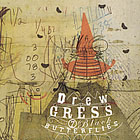Home » Jazz Articles » Live Review » Giacomo Gates Sings at Dizzy's Club Coca-Cola
Giacomo Gates Sings at Dizzy's Club Coca-Cola
 On Thursday night, April 28, Giacomo Gates went on stage at Dizzy's Club Coca-Cola as part of a five night "After Hours" stint. His longtime guitarist Tony Lombardozzi and bassist Earl May were on hand to accompany him.
On Thursday night, April 28, Giacomo Gates went on stage at Dizzy's Club Coca-Cola as part of a five night "After Hours" stint. His longtime guitarist Tony Lombardozzi and bassist Earl May were on hand to accompany him.Giacomo Gates is a singer who has created a niche for himself. His performance is a combination of straight singing, scat singing and vocalese (where the singer does a lyric written to an instrumental solo that was mostly created by any one of the great bop performers). Vocalese is not done by many singers, but Giacomo Gates does it well, especially when he has to sing a mouthful of words and make you understand each syllable. His repertoire is designed to show off all of his vocal expertise as well as his sense of humor.
This evening he started off with "Bebop Lives" (the standard instrumental "Boplicity" with lyrics). The song is a salute to bebop and this rendition featured a tasty guitar solo by Tony Lombardozzi and Gates's fun scat chorus. "Baby, You Should Know It," with a lyric written by Bob Dorough, also featured a scat chorus and showed off Gates' lung power with one very long-held note. Added to this was more tasty guitar work and a nicely stated bass solo by Earl May. The next tune started off with a chorus of Irving Berlin's "Blue Skies" and turned into "In Walks Bud" which is based on the "Blue Skies" chord changes. Gates did a scat chorus on this one and then proceeded to imitate the bass (which he does perfectly).
The next offering was "Lady Be Good," with guitar and bass solos leading into Gates singing "Disappointed," which has lyrics by Eddie Jefferson written to Charlie Parker's line over the "Lady Be Good" changes. "Let's Cool One" has lyrics written by Giacomo Gates that talk about "Peace of Mind." After the vocal chorus, Gates imitated a trombone for a solo and gave Earl May a rest by also taking a vocal bass solo. "Scotch and Soda," an easy, relaxed ballad about love making you feel high featured some pretty guitar work by Tony Lombardozzi. Lee Morgan's "Speed Ball" with Gates's lyric becomes "Spinnin'," a song about a love affair with mucho ups and downs. A seldom done Bobby Troup song called "Hungry Man" is about all kinds of food in a lot of different geographical locations. It has a clever lyric with fun rhymes and Gates delivered it with a wonderful touch of humor in his voice.
The jazz classic "Night In Tunisia," with Eddie Jefferson's lyrics, is a familiar favorite and Gates did an a capella scat chorus on this one. A bluesy guitar and a soulful vocal rendition highlighted "Since I Fell For You." The set ended with "Jeannine" (music by Duke Pearson and lyrics by Oscar Brown, Jr.) Everyone swung on this one - guitar solo, bass solo and Gates's scat chorus as well.
Introducing each of the songs he performed with an anecdote or a description of the origin of the vocalese lyrics, Gates always gave credit to the creators, as well as to his musicians. In this way, he kept an ongoing connection with the audience as well as sharing interesting information.
Giacomo Gates has a warm quality in his voice and a little bit of gravel which adds an interesting texture. His personality is laid-back and easy. He likes to sing about bebop and bop musicians, and happy and sad relationships. He is a jazz storyteller whose vocal abilities allow him to express a whole range of subjects...and instruments. But most of all, Giacomo Gates is cool.
Tags
PREVIOUS / NEXT
Giacomo Gates Concerts
Support All About Jazz
 All About Jazz has been a pillar of jazz since 1995, championing it as an art form and, more importantly, supporting the musicians who make it. Our enduring commitment has made "AAJ" one of the most culturally important websites of its kind, read by hundreds of thousands of fans, musicians and industry figures every month.
All About Jazz has been a pillar of jazz since 1995, championing it as an art form and, more importantly, supporting the musicians who make it. Our enduring commitment has made "AAJ" one of the most culturally important websites of its kind, read by hundreds of thousands of fans, musicians and industry figures every month.
























